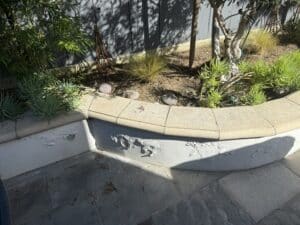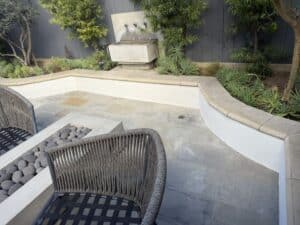If you’ve noticed your retaining wall paint bubbling, cracking, or peeling—especially after just a year or two—you’re not alone. Here in San Juan Capistrano, painted retaining walls often fail prematurely. And it’s not always because of poor craftsmanship. In many cases, it’s because the wrong product was used for the wrong conditions.
At Rhino Shield of Southern California, we’ve been helping homeowners tackle these exact issues for years. This blog breaks down the main reasons your retaining wall paint might be failing and what you can do to protect it moving forward.

Common Reasons Retaining Wall Paint Fails in San Juan Capistrano
1. Trapped Moisture from the Soil Side
Retaining walls are constantly under pressure—not just from the soil behind them, but from moisture that slowly seeps through the structure. If the paint on the outside of the wall isn’t breathable or properly sealed, trapped moisture will cause it to blister, bubble, or flake off.
2. Wrong Type of Paint or Primer for Masonry or Concrete
Regular latex paint isn’t designed to handle the movement and porosity of materials like concrete or stucco. These surfaces expand and contract with heat, humidity, and moisture, and most paints simply can’t keep up.
3. Inadequate Surface Prep
Even the best paint in the world will fail if the surface isn’t prepped properly. Retaining walls need to be pressure washed, free of efflorescence, patched, and completely dry before paint or coatings are applied.
4. UV and Salt Air Exposure
In San Juan Capistrano, we’re close enough to the coast that salt air and intense UV radiation can wreak havoc on exterior paint. That means even well-applied products can fade, crack, or chalk prematurely without UV and salt resistance.
5. No Back Drainage or Waterproofing
If water can’t drain away from the wall correctly—or there’s no waterproof membrane on the soil side—it increases hydrostatic pressure and leads to internal moisture issues that destroy the paint from underneath.

How to Protect Your Retaining Walls (The Right Way)
Use the Right Primer and Top Coat
For retaining walls you want to ensure you use a primer that will seal the wall. There are great products out there like this one, that help prevent water from seeping through the wall. This paired with a Coating like Rhino Shield are specifically engineered for exterior masonry. With built-in breathability, elastomeric flexibility, and UV/salt resistance, they hold up against the exact challenges we face here in South Orange County.
Prep Like a Pro
- Power wash the wall
- Patch and seal cracks
- Neutralize efflorescence
- Let the surface dry fully
Don’t Skip Primer
Always use a masonry bonding primer that’s compatible with your topcoat. This improves adhesion and helps the finish last.
Address Drainage
If your retaining wall has standing water issues or saturated soil, consult a landscape contractor about installing French drains or back-drainage systems to relieve pressure.
Why This Matters in San Juan Capistrano
Many homes in San Juan Capistrano are built into hillsides or elevated lots that rely on retaining walls to hold back soil. These walls are highly visible and often part of the landscaping. A failing paint job doesn’t just look bad—it may indicate moisture issues that can worsen over time.
Using the wrong paint system could mean repainting every 2–3 years. Choosing the right one up front could mean decades of peace of mind.
Final Thoughts
If you’re tired of seeing your retaining wall paint fail, it’s probably not your fault—it’s the system. At Rhino Shield of Southern California, we offer advanced protective coatings that are designed to last, even on tricky surfaces like retaining walls.
Want to see if Rhino Shield is the right fit for your retaining wall? Check us out here at our Website or if your ready to book a free estimate you can do that too!
